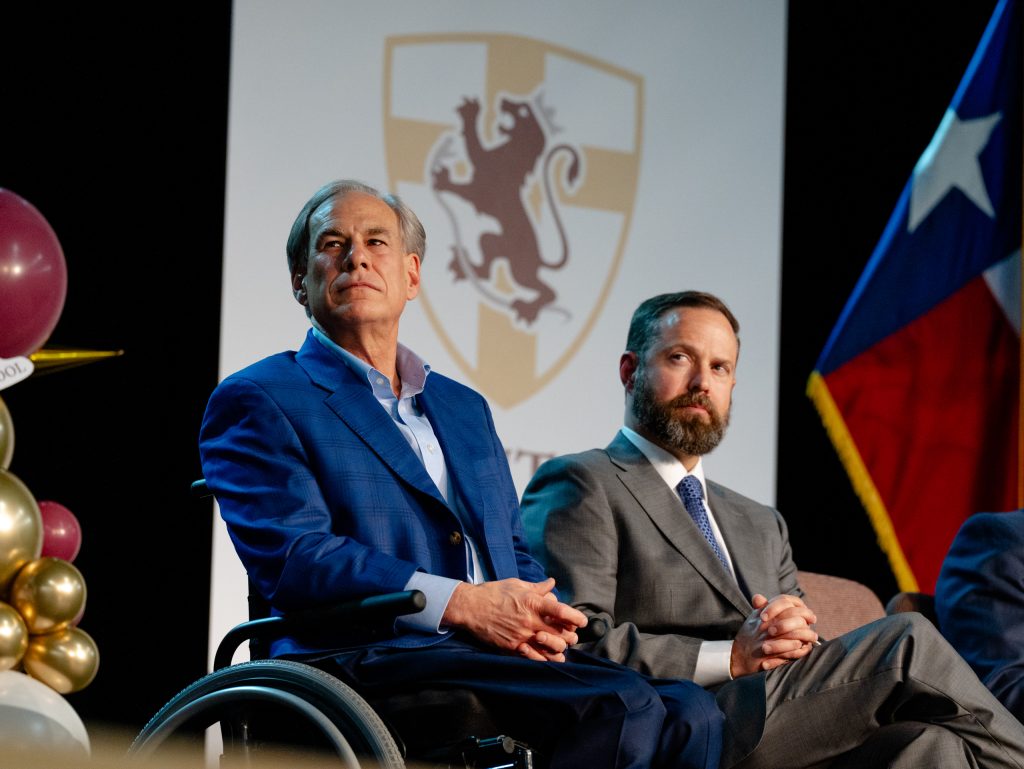Gov. Greg Abbott stopped by San Antonio Christian School Monday to rally parents in support of the passage of Senate Bill 2, a bill that would offer families up to $10,000 a year per student in taxpayer dollars for private school tuition, tutoring, textbooks and other education-related expense through state-managed education savings accounts.
He urged those in attendance to call their state House representatives in support of school vouchers, and promised to prioritize funding public schools.
“We’re going to provide more funding and when this session ends we will provide more funding than ever in the history of our state for our public schools,” Abbott said.
Abbott was accompanied by House Speaker Dustin Burrows, state Rep. Brad Buckley (R-Killeen), who was appointed chair of the House Public Education Committee, and Republican state Reps. Marc LaHood and John Lujan, among other GOP members.
Across the street from the Christian private school on the city’s far North Side, parents and members from groups that oppose school vouchers — including Our Schools San Antonio and North East Independent School District Community Advocates — held signs and yelled “Public dollars for public schools!” and “Vouchers are a scam!”
According to a social media post, the demonstrators showed up to protest the governor’s “presence in S.A. and denounce his radical, anti-public education agenda.”
Inside the school’s auditorium, Abbott promised he would prioritize public schools in Texas and assured attendees that funding a “school choice” bill would not cut into the budget for public schools.
However, Texas budget experts concluded in their fiscal analysis of SB 2 that public schools, which receive money based on attendance, may experience a decrease in funding due to students leaving the public school system to participate in the voucher program. Public schools receive a basic state allotment of $6,160 per student enrolled.
The last time public schools saw a significant increase in funding from the state per student was in 2019. Last legislative session, the state had a record budget surplus of $34 million, but schools didn’t get a needed boost in funds because Abbott made it contingent on the passage of a school voucher program.
Ultimately, Abbott wasn’t able to convince holdouts and the bill failed.
This session, Abbott is pushing to allocate $1 billion to establish what he’s calling a universal school choice program through education savings accounts.
“School choice has already passed out of the Texas Senate,” Abbott said. “It has two more steps. One, it needs to pass the Texas House. Two, you need a governor who will sign school choice.”
Burrows, who did not originally have Abbott’s support when he ran for speaker of the House, said on Monday in San Antonio that the Texas House would pass the voucher bill to ensure parents “have the freedom” to choose differently for their child if they’re not satisfied with their schools.

Among the protesters across the street, were Lizzeth Saldana and Juan Valenzuela, parents to Dante Valenzuela, 7, who has Down syndrome.
Dante was rejected from seven private schools because of his special needs, Valenzuela, who is the board director for the Down Syndrome Association of South Texas, said in Spanish. Even though Valenzuela said his family can afford to pay private school tuition, all private schools he’s applied for Dante to attend, including religious ones, won’t let him enroll.
If public schools stop receiving funding for special education because of school choice, Valenzuela said he and his wife would be left without options.
Private schools are not required to provide special education under Texas statute.
According to the Texas Tribune, only 67 private schools in Texas offer services for special education students as of 2023, with most having limits on the type of disabilities they can accommodate. There are more than 700,000 students enrolled in public social education programs.
If SB 2 passes the state House, without any changes, and is signed into law by Abbott, children with disabilities could receive $11,500, home-schooled students could receive $2,000 and home-schooled students with disabilities could receive $2,500. But like in Dante’s situation, these families may not be able to find a private school that would accept their children.








